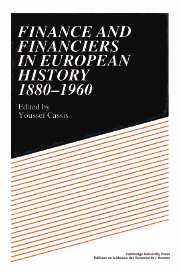Book contents
- Frontmatter
- Contents
- List of figures
- List of tables
- Preface
- 1 Introduction: the weight of finance in European societies
- 2 Banking and industrialization: Rondo Cameron twenty years on
- Part I FINANCIAL SECTOR AND ECONOMY
- Part II FINANCIAL ELITES AND SOCIETY
- 7 Financial elites and British society, 1880–1950
- 8 Bankers in French society, 1860s–1960s
- 9 The banker in German society, 1890–1930
- 10 Financial elites and society: comments
- Part III FINANCIAL INTERESTS AND POLITICS
- Part IV FINANCE AND FINANCIERS IN SMALLER EUROPEAN COUNTRIES
- Part V THE RISE OF EXTRA-EUROPEAN FINANCIAL CENTRES
- Index
8 - Bankers in French society, 1860s–1960s
Published online by Cambridge University Press: 12 January 2010
- Frontmatter
- Contents
- List of figures
- List of tables
- Preface
- 1 Introduction: the weight of finance in European societies
- 2 Banking and industrialization: Rondo Cameron twenty years on
- Part I FINANCIAL SECTOR AND ECONOMY
- Part II FINANCIAL ELITES AND SOCIETY
- 7 Financial elites and British society, 1880–1950
- 8 Bankers in French society, 1860s–1960s
- 9 The banker in German society, 1890–1930
- 10 Financial elites and society: comments
- Part III FINANCIAL INTERESTS AND POLITICS
- Part IV FINANCE AND FINANCIERS IN SMALLER EUROPEAN COUNTRIES
- Part V THE RISE OF EXTRA-EUROPEAN FINANCIAL CENTRES
- Index
Summary
For over a century, particularly in France, financiers have been the target of recurrent and impassioned attacks by politicians and journalists seeking to expose their power. With the fall of the Second Empire, Georges Duchêne, a follower of Proudhon, challenged these ‘neofeudalists’ who made up the boards of directors of limited companies and thus between them controlling the credit of France. From the crash of the Union Générate in 1882 until the end of the century, anti-Semitism inspired new campaigns: in Les rois de la République. Histoire de lajuiverie (2 volumes, 1883 and 1886) the propagandist Auguste Chirac gave full reign to a theme which Toussenel, a follower of Fourier, had already exploited in 1847. During the belle époque, a polemical work entitled Contre l' oligarchic financière, written by a journalist under the pseudonym of Lysis, was reprinted eleven times between 1906 and 1912, while éditions de la Guerre Sociale published La Démocratie et les financiers in which Francis Delaisi attempted to show how ‘the sovereignty of the people is a myth’ since ‘financiers rule France’. In 1925, at the height of the franc crisis, Chastenet, a member of parliament, in turn attacked the ‘financial oligarchy’ and the ‘international fraternity of bankers’ in La République des banquiers. With the economic crisis of the 1930s, the struggle intensified from all sides against these ‘two-hundred families’ who, the radical leader Daladier inveighed, ‘are the masters of the French economy and, in effect, of French polities’.
- Type
- Chapter
- Information
- Finance and Financiers in European History 1880–1960 , pp. 147 - 160Publisher: Cambridge University PressPrint publication year: 1991
- 3
- Cited by



